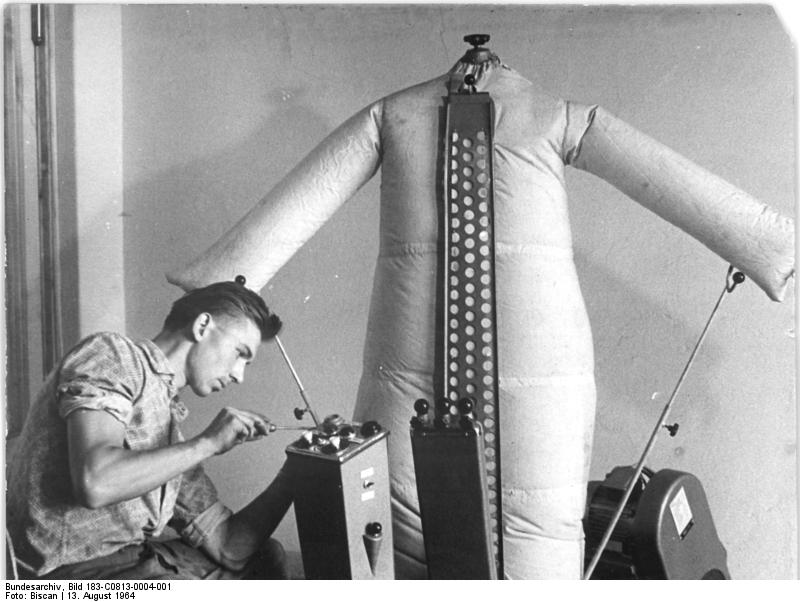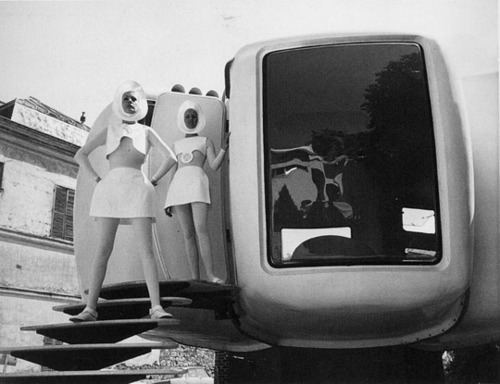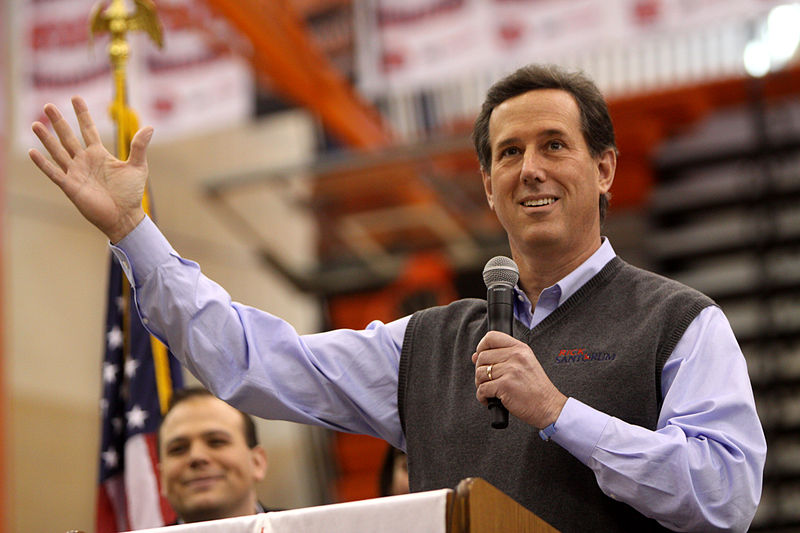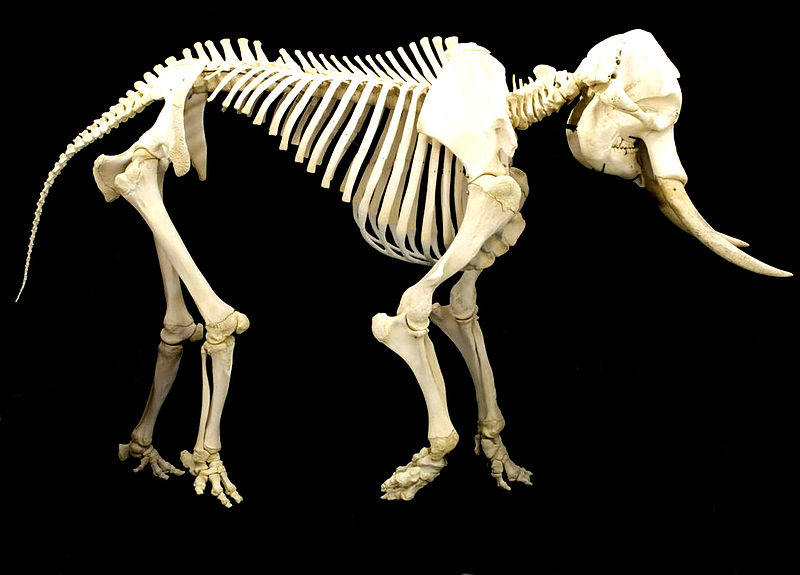Amazon just acquired Kiva Systems robotics for $775 million to automate its warehouses. From IEEE Spectrum: “What does Kiva do that got Amazon so interested? Basically, Kiva has reinvented the centuries-old warehouse business, transforming distribution centers — which previously relied on slow-moving humans to walk around picking and packing goods — into a buzzing hive of superefficient, tireless robotic workers.”
You are currently browsing the archive for the Excerpts category.
Salon has a provocative excerpt from Dick Teresi’s new book, The Undead, which examines the difficulty of establishing when life has truly ceased, an issue that will only become infinitely thornier in the coming decades. The opening of “The Evolution of Death“:
“Michael DeVita of the University of Pittsburgh recalls making the rounds at a student teaching hospital with his interns in tow when he remembered that he had a patient upstairs who was near death. He sent a few of the young doctors ‘to check on Mr. Smith’ in Room 301 and to report back on whether he was dead yet. DeVita continued rounds with the remainder of the interns, but after some time had passed he wondered what happened to his emissaries of death. Trotting up to Mr. Smith’s room, he found them all paging through ‘The Washington Manual,’ the traditional handbook given to interns. But there is nothing in the manual that tells new doctors how to determine which patients are alive and which are dead.
Most of us would agree that King Tut and the other mummified ancient Egyptians are dead, and that you and I are alive. Somewhere in between these two states lies the moment of death. But where is that? The old standby — and not such a bad standard — is the stopping of the heart. But the stopping of a heart is anything but irreversible. We’ve seen hearts start up again on their own inside the body, outside the body, even in someone else’s body. Christian Barnard was the first to show us that a heart could stop in one body and be fired up in another. Due to the mountain of evidence to the contrary, it is comical to consider that “brain death” marks the moment of legal death in all fifty states.
The search for the moment of death continues, though hampered by the considerable legal apparatus that insists that it has already been found.”
••••••••••
Bernie, reborn, doing conga:
Read also:
Tags: Dick Teresi, Michael DeVita
The opening of “Versailles, the Would-Be Biggest House in America,” Susan Berfield’s stomach-turning yet amusing Businessweek account of David and Jackie Siegel’s attempt to realize their most ostentatious fantasies, to build a fun-house mirror version of the American Dream:
“‘Our house is like a convention center compared to the other houses here,’ says David Siegel as he drives through The Reserve at Lake Butler Sound, a gated community in Orlando. The other houses here are not small: They average 10,000 square feet. But his home will be nine times as large. Siegel stops at the end of Kirkstone Lane, pulls into his driveway, and looks around. ‘Next door is a 12,000-square-foot house. That could be my maid’s quarters one day,’ he says lightly. Then he catches himself and adds, ‘No, I shouldn’t say that, it sounds like an insult.’
David and Jackie Siegel’s dream house sits on 10 acres of lakefront property. Built on a custom-made hill, it occupies one full acre and, when finished, will be the largest home in the country. David, the founder and chief executive officer of the biggest private time-share company in the world, Westgate Resorts, designed it. He and Jackie named it Versailles.”
••••••••••
Lauren Greenfield’s documentary about the building of Versailles:
Tags: David Siegel, Jackie Siegel, Lauren Greenfield, Susan Berfield
You pre-ordered the New iPad, you huge douche, but you do not yet have this: a body tattoo that vibrates when your phone receives a call or text. Nokia has patented just such an invention and hopes to market it in temporary and permanent options. From the BBC:
“Vibrating magnetic tattoos may one day be used to alert mobile phone users to phone calls and text messages if Nokia follows up a patent application.
The Finnish company has described the idea in a filing to the US Patent and Trademark Office.
It describes tattooing, stamping or spraying ‘ferromagnetic’ material onto a user’s skin and then pairing it with a mobile device.
It suggests different vibrations could be used to create a range of alerts.
The application lists Cambridge-based Zoran Radivojevic as the innovation’s lead inventor. It was filed last week and was brought to light by the Unwired View news site.
It suggests a magnetic marking could be attached to either a user’s arm, abdominal area, finger or fingernail.”
Tags: Zoran Radivojevic
Even in the 1930s, Nathanael West could see that media was becoming mass, that the Horatio Alger myth, a cruel hoax that pretended the exception was the rule, would soon be oppressively disseminated to all of America–to all of the world. From “He Foresaw History,” David Ulin’s 1997 Los Angeles Times article about West’s prescient prose:
“For West, the very substance of modern life exists in the place where the medium and the audience connect. His aesthetic was firmly rooted in the idea of mass communication, which by the 1930s, he recognized, had begun to change American culture in unpredictable ways. It’s one of the things that sets him apart from his contemporaries, and, as such, may have contributed to his marginal status.
‘In the 1930s,’ Veitch suggests, ‘American literature was dominated by icons of the left, like Ma Joad, but West wrote against that; he was a writer on the left who didn’t write about leftist themes. Instead, he wrote about consumerism. He wrote about the America that was emerging, the America of mass culture. At a time when the left had disdain for that, West homed in on it, using cliches, cartoons, comics, Tin Pan Alley songs. Miss Lonelyhearts is a slap in the face to the left’s fascination with folk culture, as is The Day of the Locust.”
His take on popular culture emerges not just in the substance of his writing, but in its style. Miss Lonelyhearts, for instance, was conceived as a ‘novel in the form of a comic strip’; ‘I abandoned this idea,’ West wrote in 1933, ‘but retained some of the comic strip technique: Each chapter, instead of going forward in time, also goes backward, forward, up and down in space like a picture. Violent images are used to illustrate commonplace events.’
Writing in a voice that is deliberately flat, West portrays a newspaper advice columnist, caught between the cynicism of his editor, Shrike, and the despair of his readers, who, in a society where God has been replaced by the manufactured images of mass imagination, have nowhere else to turn for meaning. As Shrike declares, ‘The Miss Lonelyhearts are the priests of 20th century America.’ Miss Lonelyhearts becomes a counterpart for Christ, and his column a modern source of communion.
The Day of the Locust focuses the same perspective on the desperate dreams of Hollywood. And A Cool Million--a broad farce that, in tracing the disasters that befall a young man named Lemuel Pitkin when he sets out to seek his fortune, turns the Horatio Alger formula on its ear–touches on this issue. What these books have in common is a sense of mass illusion, of image somehow substituted for reality until there is little difference between the two.
‘West’s subject,’ says Library of America Publisher Max Rudin, ‘is the selling of mass fantasy, the American business of dreams.’
Elaborates Bercovitch: “There’s a sense in West of public life having a stage set quality, of the marketplace as a giant betrayal not just of America but of all human dreams. Yet while he understands this, he remains susceptible to the pathos of human need.'”
••••••••••
“Isn’t it romantic?”:
Tags: David L. Ulin, Nathanael West
Quaint and terrifying math about American Internet usage from The Next Web:
“According to a study (PDF) from the Department of Commerce’s National Telecommunications and Information Administration (NTIA), around 30 percent of US citizens do not use the internet for anything, whether they’re at work or at home. Given that there are 304 million people in the United States, that’s about 91.2 million people who still don’t even use email.
The scariest thing about this report is that in this group of around 91 million people, 37.8% say they just don’t need broadband internet connections. As Ars Technica points out, the United States almost requires a decent internet connection for someone to do well; the vast majority of applying to get a job or to get into college is done online.”
Science has proven that reading novels, unsurprisingly, makes us more empathetic people, but it’s a little startling that the brain apparently makes no distinction between actual experience and the experiences we read about in a novel. From Annie Murphy Paul in the NYT:
“The brain, it seems, does not make much of a distinction between reading about an experience and encountering it in real life; in each case, the same neurological regions are stimulated. Keith Oatley, an emeritus professor of cognitive psychology at the University of Toronto (and a published novelist), has proposed that reading produces a vivid simulation of reality, one that ‘runs on minds of readers just as computer simulations run on computers.’ Fiction — with its redolent details, imaginative metaphors and attentive descriptions of people and their actions — offers an especially rich replica. Indeed, in one respect novels go beyond simulating reality to give readers an experience unavailable off the page: the opportunity to enter fully into other people’s thoughts and feelings.”
••••••••
Novelist Henry Miller takes a swim:
Tags: Annie Murphy Paul, Keith Oatley
Not so long ago, both sides of the aisle agreed that America was going to grow ill and poor if we didn’t have comprehensive health-care reform. Now because of politics, lobbyists and ignorance, the Affordable Care Act, a reasonable first step in reform, is under constant attack. From Krugman:
“For now, however, most of the disinformation involves claims about costs. Each new report from the Congressional Budget Office is touted as proof that the true cost of Obamacare is exploding, even when — as was the case with the latest report — the document says on its very first page that projected costs have actually fallen slightly. Nor are we talking about random pundits making these false claims. We are, instead, talking about people like the chairman of the House Republican Policy Committee, who issued a completely fraudulent press release after the latest budget office report.
Because the truth does not, sad to say, always prevail, there is a real chance that these lies will succeed in killing health reform before it really gets started. And that would be an immense tragedy for America, because this health reform is coming just in time.
As I said, the reform is mainly aimed at Americans who fall through the cracks in our current system — an important goal in its own right. But what makes reform truly urgent is the fact that the cracks are rapidly getting wider, because fewer and fewer jobs come with health benefits; employment-based coverage actually declined even during the ‘Bush boom’ of 2003 to 2007, and has plunged since.
What this means is that the Affordable Care Act is the only thing protecting us from an imminent surge in the number of Americans who can’t afford essential care. So this reform had better survive — because if it doesn’t, many Americans who need health care won’t.”
Tags: Paul Krugman
From “Why Countries Go Bust,” Adam Davidson’s New York Times Magazine piece about the poverty-reduction theories of superstar economist Daron Acemoglu, an explanation of how we managed to screw up even the post-Hussein Internet access market in Baghdad:
“On April 9, 2003, the day the city was captured, one of the world’s most tightly controlled economies suddenly became a free-for-all. Amid the chaos, many former state functionaries turned into entrepreneurs. Nearly every engineer from the ministry of housing, it seemed, had opened his own construction company. Satellite TVs, once illegal to all but a very small elite, were sold on every major street. Under Hussein, only one company (widely rumored to be monitored by the intelligence service) offered Internet access, and it was incredibly bad and expensive. After it was gone, there were so many new Internet companies that I had far more access options then than I do today in Brooklyn.
Yet the American authorities, who had not planned for this budding free market, all but destroyed it when they gave the bulk of new contracts to large companies outside the country. Often, these outsiders subcontracted to Iraqi firms with close ties to the state’s new political establishment. By the anniversary of the United States invasion, it was clear that economic success would again come from connections and corruption rather than talent and hard work. Today, Transparency International ranks Iraq as one of the most corrupt nations on earth. An Iraqi friend once told me that he had hoped we would teach the Iraqis how to be Americans. Instead, the Americans learned how to be Iraqi.”
Tags: Adam Davidson, Daron Acemoglu
Pro hockey players are using computers to try to train their brains to better focus and concentrate. From Tal Pinchevsky at NHL.com:
“Muscles can be toned, endurance can be refined, leadership qualities can be taught. But how do you train a hockey player’s brain? Can a coach work the areas of a player’s brain responsible for awareness and intuition?
The Israeli Air Force, of all people, has the answer.
More specifically, the answer comes from Applied Cognitive Engineering, or ACE, an Israeli technology company that has worked with the Israelis and the U.S. Air Force, as well as NASA and the American military’s Defense Advanced Research Projects Agency. Originally used to train fighter pilots, ACE’s IntelliGym is now being adopted by more and more hockey coaches.
The cognitive training system develops players’ awareness and ability to make fast-paced decisions and has already made its mark on the hockey world in just three years.
‘We had no idea what to expect. It kind of looked like a video game. Sure enough, you could see how it related to hockey and increased your awareness and knowledge,’ said Michael Cornell, a junior defenseman and alternate captain at the University of Maine, whose team used the IntelliGym last season. ‘I think it was one of those things where it became almost second nature. I read this play differently because of the tools I’ve been using. It helped develop a high level of awareness for me.'”
Tags: Tal Pinchevsky

"In a society where everything is for sale, life is harder for those of modest means." (Image by flyingpurplemonkeys.)
In a highly connected world full of extreme economies, desire and desperation ensure that everything can be bought or sold somewhere in the global village. From “What Isn’t For Sale?” Michael J. Sandel’s new Atlantic article:
“Why worry that we are moving toward a society in which everything is up for sale?
For two reasons. One is about inequality, the other about corruption. First, consider inequality. In a society where everything is for sale, life is harder for those of modest means. The more money can buy, the more affluence—or the lack of it—matters. If the only advantage of affluence were the ability to afford yachts, sports cars, and fancy vacations, inequalities of income and wealth would matter less than they do today. But as money comes to buy more and more, the distribution of income and wealth looms larger.
The second reason we should hesitate to put everything up for sale is more difficult to describe. It is not about inequality and fairness but about the corrosive tendency of markets. Putting a price on the good things in life can corrupt them. That’s because markets don’t only allocate goods; they express and promote certain attitudes toward the goods being exchanged. Paying kids to read books might get them to read more, but might also teach them to regard reading as a chore rather than a source of intrinsic satisfaction. Hiring foreign mercenaries to fight our wars might spare the lives of our citizens, but might also corrupt the meaning of citizenship.
Economists often assume that markets are inert, that they do not affect the goods being exchanged. But this is untrue. Markets leave their mark. Sometimes, market values crowd out nonmarket values worth caring about.”
Tags: Michael J. Sandel
It would make sense that the lingua franca becomes simpler and flatter as people communicate more widely, as they need to find common ground with others from a variety of backgrounds and locations. And what has spellcheck, texting, etc. wrought for language? From Charles Choi at Discovery:
“The investigators found words began dying more often in the past 10 to 20 years than they had in all the time measured before. At the same time, they discovered languages were seeing fewer entirely new words emerging. They suggest that automatic spell-checkers may be partly responsible, killing misspelled or unusual counterparts of accepted words before they see print.”
•••••••••••
Speaking Ubbi Dubbi, back when pencils were still in use:
Tags: Charles Choi
Collecting will change over time but never vanish. People, to varying degrees, need to own stuff. But technology has had a profound effect on the nature of collecting, reducing its tactile nature, making trash of artifacts. From USA Today:
“Spencer Haley, 33, who works at fabled Powell’s Books in Portland, Ore., once proudly displayed 3,000 hardcovers in his home. But since a Kindle joined the family, he and his wife are down to a few hundred. ‘As long as the content hits my visual cortex, it doesn’t matter what form it comes in,’ he says.
For Haley, collecting still means adding to those prized first-editions on his shelves. But it also refers to the list of e-books on his tablet, the book reviews he has amassed online and the friends who follow his recommendations via social networking.
‘I missed flipping pages for about a day,’ Haley says. ‘I don’t have CD or DVD racks anymore. Having things stored in the cloud just fits my lifestyle.'”
Tags: Spencer Haley
In the early days of autos there were more electric cars (and steam ones, for that matter) than gas-powered cars. But fossil fuels became predominant, so how do you unlearn what’s been learned, turning away from so much familiar infrastructure? Shifting to electric cars would be a much more attractive proposition if the vehicles were automatically recharged by coils embedded in the road. From Jon Stewart at BBC:
“Engineers in his lab are developing a way to wirelessly charge electric cars from magnetic coils embedded into the road. The car would pick up the power via another coil, meaning – in theory – that you would never have to make a charging stop again.
The system works using a technique called ‘magnetic resonance coupling.’ You can think about resonance as the phenomenon that allows an opera singer to smash a glass using only the power of their voice. In that case, when the singer hits a note that has the same resonant frequency as the glass, they couple and energy begins to build up in the glass, eventually causing it to smash.
Instead of using acoustic resonance, the Stanford team use the resonance of electromagnetic waves. A coil in the road that is connected to a power line is made to vibrate with the same resonance frequency as the coil on the bottom of the car, allowing energy to flow between them.”
From Robert Reich’s sober assessment of election year moralizing of condom-condemning Republicans:
“But America’s problem isn’t a breakdown in private morality. It’s a breakdown in public morality. What Americans do in their bedrooms is their own business. What corporate executives and Wall Street financiers do in boardrooms and executive suites affects all of us.
There is moral rot in America but it’s not found in the private behavior of ordinary people. It’s located in the public behavior of people who control our economy and are turning our democracy into a financial slush pump. It’s found in Wall Street fraud, exorbitant pay of top executives, financial conflicts of interest, insider trading, and the outright bribery of public officials through unlimited campaign ‘donations.’
Political scientist James Q. Wilson, who died last week, noted that a broken window left unattended signals that no one cares if windows are broken. It becomes an ongoing invitation to throw more stones at more windows, ultimately undermining moral standards of the entire community
The windows Wall Street broke in the years leading up to the crash of 2008 remain broken. Despite financial fraud on a scale not seen in this country for more than eighty years, not a single executive of a major Wall Street bank has been charged with a crime.” (Thanks Browser.)
•••••••••••
Robert Reich, buddy cop:
Tags: Robert Reich
The opening of John Brockman’s Edge essay about influential if eccentric evolutionary theorist Robert Trivers, which reads like a hallucination:
“Thirty years ago, Robert Trivers disappeared.
My connection to him is goes back to the 1970s. He had left Harvard and was roaming around Santa Cruz when I was introduced to him in a telephone call by our mutual friend Huey P. Newton, Chairman of The Black Panther Party. Huey put Robert on the phone and we had a conversation in which he introduced me to his ideas. I recall noting at the time the power and energy of his intellect. Huey, excited by Robert’s ideas on deceit and self-deception, was eager for the three of us to get together.
We never had the meeting. Huey met a very bad end. I lost track of Robert. Over the years there were rumors about a series of breakdowns; he was in Jamaica; in jail.
He fell off the map.
But during his thirty year disappearance, the influence of his ideas has grown and transcended the purely scientific arena. And through all his ups and downs, he never stopped working on his theories.”
Tags: John Brockman, Robert Trivers
Our ability to project our emotions onto computer code makes video games possible. From “Creating the Illusion of Emotion, or Why You Care About Ones and Zeroes,” by Brian Crecente in the Vancouver Sun:
“David Mark, president of AI design consultant Intrinsic Algorithm, spent about half an hour last week walking game developers through what he called the psychology of artificial intelligence. He used to time to give the game-makers tips on how to make gamers feel like they’re in a world populated by real people instead of digital automatons.
The key, he said, is to find a way to get gamers to project their own emotions and psychology onto the game’s characters.
‘In the absence of defining information people project what they believe should be there,’ he said.
To prove his point, Mark showed the Heider-Simmel demonstration, an animated video created by psychologists Fritz Heider and Mary-Ann Simmel in the 1940s to explore the ‘attribution of causality.’
The short video shows two animated triangles, an animated circle and a box. There was no audio, just the crude line drawings moving around. After showing the video he said that most viewers saw the video as a couple and a bully; or a mother, a child and a bad guy; or a father and a couple. Each viewer created their own, sometimes elaborate back story for the simple drawings.
‘It’s really just two triangles, a circle and some lines,’ Mark pointed out.
In the absence of information, viewers created their own fiction, their own emotional attachments. But movement and positioning, he added, does help shape context.”
••••••••••
Heider-Simmel Demonstration, an experimental study of apparent behavior:
Tags: Brian Crecente, David Mark, Fritz Heider, Mary-Ann Simmel
From “A Voyage to the Sun,” a really nice piece of writing from 1999 by Michael Paterniti in Esquire, about extreme science in the New Mexico desert:
“See, the Machine is not like other machines. It’s not a Saab with heated leather seats and a refrigerated glove compartment. It demands security clearance. It demands care and reverence. And if you’re Chinese–or if you’re a Toblerone-loving Swiss, for that matter–you can’t come here. You can’t get past the armed guard at the front gate or the second gate at Area IV or the concertina wire or the ID-activated, secret-combination metal doors to the hangar-sized sandstone building where the Machine lives.
And the people here, Jimmy Potter and his tech crew and the array makers and the laser technicians and the classified team of scientists burrowing in the Habitrail of their own minds for some small epiphany, for some shred of insight into the Machine–the whole lot of them numbering maybe 130–they bring their love, their dizzy, stupid, human love, and their vanity and ambition and dreams, and all of it gets shot into the Machine. Envy, greed, betrayal . . . shot into the Machine. Glory, honor, brilliance . . . shot in. Some shoot in their god, too.
It begins with the simple flip of a cyber switch in a control room at the north end of the hangar. Before a bank of computer screens, a man clicks a mouse, and then electricity, quietly sucked right off the municipal power grid in Albuquerque, floods into the outer ring of Marx generators. Which is when the Machine takes control. A siren sounds, red lights flash, doors automatically lock. The frogmen and the white and blue jumpsuits clamber over the high bay, down the metal steps, and retreat to a copper-coated room behind a foot of cement.
Another switch is flipped, another mouse clicked. To the piercing sound of an alarm, a countdown in the Marx generators ensues, or rather a count up, in kilovolts. Comes in a monotone, almost hollow voice beneath the frantic alarm. The man in the control room on a tinny loudspeaker, the Machine speaking through the human.
‘Twenty kV. . . .’
‘Thirty kV. . . .’
‘Forty kV. . . .'” (Thanks TETW.)
Tags: Michael Paterniti
I actually didn’t realize the Encyclopaedia Britannica was still publishing a print version, but that anachronism is no more. From Computerworld:
“After 244 years, the Encyclopaedia Britannica will cease publishing its flagship encyclopedia and concentrate on its digital offerings.
“We’d like to think our tradition is not to print, but to bring scholarly knowledge to the people,” said Jorge Cauz, president of Encyclopaedia Britannica.
Britannica has printed the encyclopedia, which now runs to 32 volumes in length, since 1768. The 2010 edition was the last edition the company published. It has decided not to print what would be the 2012 edition, which would have been out by the end of the year. The company has about 4,000 sets of the 2010 edition still available for sale. Overall about 2 million sets have been printed through the entire run of the encyclopedia.
Britannica’s move to stop printing encyclopedias is a telling moment in this point in history, when print is being superseded by websites and network-connected applications.”
••••••••••
Richard Feynman in 1959: “Why can’t we write the entire 24 volumes of the Encyclopaedia Britannica on the head of a pin?”
An early expression of globalization, from a speech in Network, 1976.
“You have meddled with the primal forces of nature, Mr. Beale, and I won’t have it! Is that clear? You think you’ve merely stopped a business deal. That is not the case! The Arabs have taken billions of dollars out of this country, and now they must put it back! It is ebb and flow, tidal gravity! It is ecological balance! You are an old man who thinks in terms of nations and peoples. There are no nations. There are no peoples. There are no Russians. There are no Arabs. There are no third worlds. There is no West. There is only one holistic system of systems, one vast and immane, interwoven, interacting, multivariate, multinational dominion of dollars. Petro-dollars, electro-dollars, multi-dollars, reichmarks, rins, rubles, pounds, and shekels. It is the international system of currency which determines the totality of life on this planet. That is the natural order of things today. That is the atomic and subatomic and galactic structure of things today! And YOU have meddled with the primal forces of nature, and YOU… WILL… ATONE! Am I getting through to you, Mr. Beale? You get up on your little twenty-one inch screen and howl about America and democracy. There is no America. There is no democracy. There is only IBM, and ITT, and AT&T, and DuPont, Dow, Union Carbide, and Exxon. Those are the nations of the world today. What do you think the Russians talk about in their councils of state, Karl Marx? They get out their linear programming charts, statistical decision theories, minimax solutions, and compute the price-cost probabilities of their transactions and investments, just like we do. We no longer live in a world of nations and ideologies, Mr. Beale. The world is a college of corporations, inexorably determined by the immutable bylaws of business. The world is a business, Mr. Beale. It has been since man crawled out of the slime. And our children will live, Mr. Beale, to see that… perfect world… in which there’s no war or famine, oppression or brutality. One vast and ecumenical holding company, for whom all men will work to serve a common profit, in which all men will hold a share of stock. All necessities provided, all anxieties tranquilized, all boredom amused.”
••••••••••
Siskel (with mustache!) and Ebert praise their “favorite Christmas picture”:
From “The Dark Side of Dubai,” Johann Hari’s excellent 2009 Independent article, a tidy telling of the city state’s birth and amazing growth spurt:
“Thirty years ago, almost all of contemporary Dubai was desert, inhabited only by cactuses and tumbleweed and scorpions. But downtown there are traces of the town that once was, buried amidst the metal and glass. In the dusty fort of the Dubai Museum, a sanitised version of this story is told.
In the mid-18th century, a small village was built here, in the lower Persian Gulf, where people would dive for pearls off the coast. It soon began to accumulate a cosmopolitan population washing up from Persia, the Indian subcontinent, and other Arab countries, all hoping to make their fortune. They named it after a local locust, the daba, who consumed everything before it. The town was soon seized by the gunships of the British Empire, who held it by the throat as late as 1971. As they scuttled away, Dubai decided to ally with the six surrounding states and make up the United Arab Emirates (UAE).
The British quit, exhausted, just as oil was being discovered, and the sheikhs who suddenly found themselves in charge faced a remarkable dilemma. They were largely illiterate nomads who spent their lives driving camels through the desert – yet now they had a vast pot of gold. What should they do with it?
Dubai only had a dribble of oil compared to neighbouring Abu Dhabi – so Sheikh Maktoum decided to use the revenues to build something that would last. Israel used to boast it made the desert bloom; Sheikh Maktoum resolved to make the desert boom.” (Thanks TETW.)
Tags: Johann Hari
If I had to bet on one aspect of our lives about to change drastically, I would go with batteries. Whether or not Apple is really working on hydrogen batteries as whispers sometimes suggest, I think the term “long-life” is about to change significantly for the better. And products and processors will be made to require less and less juice, adding to the efficiency. No longer will we be tethered to a wall. From Leo Kelion of BBC News:
“Arm Holdings has unveiled what it describes as the ‘world’s most energy-efficient microprocessor’ design.
The firm says that microcontrollers based on the ‘Flycatcher’ architecture will pave the way for the ‘internet of things’- the spread of the net to a wider range of devices.
It suggests that fridges and other white goods, medical equipment, energy meters, and home and office lighting will all benefit from the innovation.
Two firms have licensed the technology.
They are NXP Semiconductors and Freescale.
‘It opens up all devices to the potential of being connected all the time,’ Freescale’s Geoff Lees told the BBC.
‘It’s allowing us to provide connectivity everywhere. So anything from consumer appliances, MP3-music audio docks, kitchen equipment with displays right through to remote sensors in rain monitoring equipment or personal medical devices – an area where ultra-long battery life allied to high performance and safety is becoming more and more important.'”
••••••••••
“Oy!”:
Tags: Leo Kelion
I’m not a materialistic person, but I would rather go to a good store than a good museum. Both are commenting on the world right now–even an exhibition of antiquities is interesting to us at this moment for some reason–but I think retail outlets with well-designed products are more stimulating, communicating more directly to us about who we are, for better or worse.
Question: Are there shops that have an app that allow you to use your smartphone to scan any item’s tag and get info and videos about products on your phone? I haven’t seen it yet, but my guess is “yes” or they will soon exist. From Stephanie Clifford’s recent New York Times article about modern shopping:
“For a generation of shoppers raised on Google and e-commerce, the answer to ‘Can I help you?’ is increasingly a firm ‘no,’ even at retailers like Nordstrom that have built their reputations around customer service.
But instead of getting defensive, some stores and brands are embracing the change by creating new personal touches that feature gadgets rather than a doting sales staff. Bobbi Brown has touch-screen televisions to demonstrate the perfect smoky eye, something that was once the exclusive domain of makeup artists. The basketball star LeBron James’s shoe store in Miami has 50 iPads to describe its merchandise. Macy’s is testing cosmetics stations where tablets offer reviews and tips. And at C. Wonder, shoppers use a touchpad to personalize the lighting and music in dressing rooms (there is also a button in case, olden-days style, they need to call for help).
The self-service theme, which started years ago with checkout at groceries, has progressed to the point where shoppers can navigate entire stores without once having to say, ‘Just looking, thanks.'”
Tags: Stephanie Clifford
If moderate conservatives like Jeb Bush are unable to rescue the Republican Party from its own extremism, if Presidential nomination victories become consistently Pyrrhic and disqualifying, will we see the emergence of a more centrist conservative party? Or is the madness of the GOP just a cycling out that will ultimately run its course? Nobody can sum up the Republicans’ recent rocky road and the fork that led it to its precarious current position more eloquently than Louis Menand does this week in the opening of his New Yorker piece, “Money Pol.” An excerpt:
“Once, when winters were cold and the world seemed large, creatures roamed the earth who were permissive on social issues and at ease with big government, yet remained ever faithful to the gods of business and finance. Their principles were abstract but broad-minded: tolerance, free trade, and a belief in something called the American Way. Their personal tastes were conventional. They were surprisingly allergic to indecorum, and disinclined to question the status quo. But they were not small-town or provincial; they were Wall Streeters, not Main Streeters. Their vista was international. They were private-sector types who answered the call to public service. They were liberal Republicans. Nelson Rockefeller was such a creature. So were Prescott Bush, William Scranton, Charles Percy, John Lindsay, Mark Hatfield, Elliot Richardson, and George Romney.
Then, one year, a powerful meteor struck the planet, and, virtually overnight, the entire species was wiped out. The meteor’s name was Ronald Reagan. Political paleontologists, looking back at the fossil record, can detect signs pointing to the organism’s imminent extinction that predate the Reagan era. Richard Nixon, for example, showed that a pro-business, big-government Republican, by appealing to suburban anti-Communism and white working-class resentment, could take a populist road to the White House. Men like Rockefeller and Romney despised Nixon; but they could never beat him. Liberal Republicans did not like to get into the political mud.”
••••••••••
Nelson Rockefeller, 1964: “The Republican Party must repudiate these people.”
Tags: Jeb Bush, Louis Menand, Nelson Rockefeller























